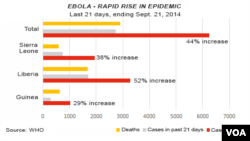Compared to previous epidemics like SARS and Avian influenza, Ebola is probably the most challenging outbreak the world has seen in the last few decades, said Dr. Keiji Fukuda, assistant director-general for health security at the World Health Organization.
“[You have] a very lethal disease, placed in a setting where the health infrastructure is very weak,” said Fukuda, an American physician with expertise in influenza epidemiology.
“It’s an area where there’s a lot of cross-border movements of people. I think it’s also a situation where it’s been hard to get enough international workers and responders into the area,” he said.
Fukuda spoke Thursday in Washington, as public health experts convened a one-day conference to discuss efforts to implement the Global Health Security Agenda – a partnership among governments, international organizations and public and private stakeholders. The conference was held at George Washington University in Washington D.C.
A follow-up GHSA meeting will take place Friday at the White House, when representatives from 44 nations push to accelerate progress toward ridding the world from infectious disease threats.
U.S. Assistant Secretary of Defense for Nuclear, Chemical, and Biological Defense Programs Andrew Weber said the Pentagon is delivering two laboratories to Liberia, one in Monrovia and another in Bong County that would have molecular diagnostic capabilities.
The facilities will be operated by U.S. Navy microbiologists and virologists.
While some talk about the need to send mobile BSL4 (biosafety level 4) laboratories to Liberia to help with the Ebola crisis, that’s not really what they need, Weber insisted. “They need rapid culture independent diagnostics.”
One of GHSA’s pillars is national and regional biosecurity systems, and while much of what’s being done now is individual-facility based, that’s not good enough, according to Weber.
“If the capacity that we seek to urgently [implement] the global security agenda had been in place, it’s likely the Ebola crisis would not have so severe,” said Laura Holgate, a senior official from the National Security Council.
“The reality is that Ebola has already killed four times the number of people that SARS did over a decade ago. Such a dramatic threat requires a long-term commitment as well as an urgent, immediate response," she said. “This is not a choice we make between these two styles. We must be doing them at the same time together and mindful of each other.”
Fukuda noted that while a lot has been done, much more is needed because of the short-term impact on food supply, security and general concerns about economies in the region.
But the bottom line, he explained, is that “this is a disease for which people, organizations and countries are afraid of because it’s infectious disease with a high mortality [rate].”
That fear needs to be addressed in order to get more people involved.
“We have to develop a reliable plan for international workers so they can be evacuated if needed or if health workers become sick. Getting [this agenda] firmly in place is one of those critical issues right now,” Fukuda said.
Dr. Melvin Korkor contracted Ebola while treating a nurse patient at Phebe Hospital in South-Central Liberia’s Bong County.
“I was so compassionate, I touched her without my [usual] precaution practices. So, a few days later I felt sick,” Korkor said. “I isolated myself from my family and later my lab results tested positive. I was transferred to Monrovia treatment center. Because I am a doctor and I knew what to do, I survived the virus.”
Korkor said no matter how frightening and deadly the disease is, people must have confidence in themselves in order to beat it.
“I want to tell the whole world that Ebola is real, it kills. But the good news is that it can prevented, and even if you suspect something that’s unusual, it’s better for you to seek prompt medical attention," he said.
“If you [think] you have Ebola, don’t hide yourself, don’t keep away, come to the hospital at the earliest possible [moment] and you’ll be saved,” he advised his fellow Africans.




